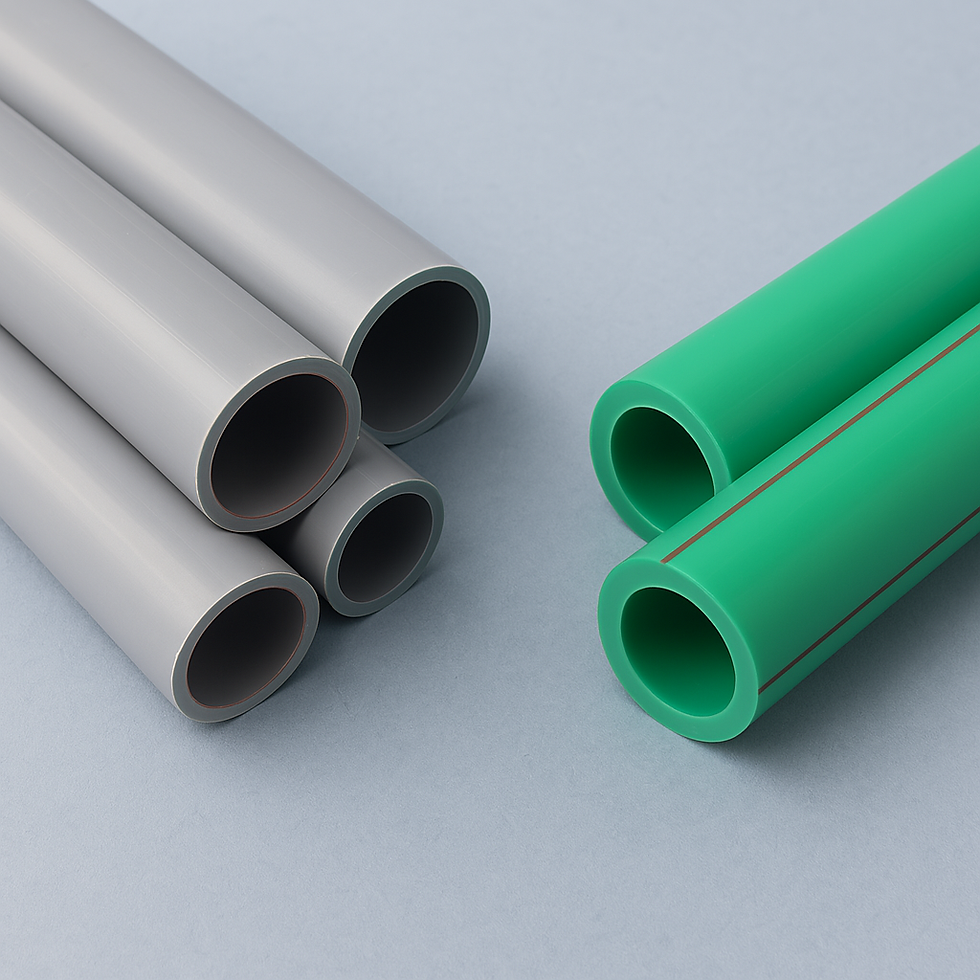Plastic Pipes' Role in Water Supply and Distribution Systems
- Adamjee DuraBuilt
- Jul 10, 2023
- 3 min read
Updated: Jul 15, 2023

Plastic pipes have evolved as a versatile and dependable option in the field of water supply and distribution systems, transforming the way water is supplied to homes, companies, and communities. This article digs into the vital role that plastic pipes play in water supply and distribution systems, emphasizing its advantages, uses, and beneficial influence on guaranteeing safe and efficient water delivery.
Advantages of Plastic Pipes in Water Supply and Distribution Systems
Durability and Longevity
Plastic pipes, such as PVC Pipes and HDPE Pipes, provide outstanding resilience and lifespan. They are resistant to corrosion, chemical deterioration, and scale accumulation, resulting in a longer lifespan and fewer replacements. Plastic pipes can endure changes in water pressure and temperature while preserving structural integrity over time.
Excellent Flow Characteristics
Due to the smooth inside surfaces of plastic pipes, they offer great hydraulic qualities. Their low friction coefficient provides for efficient water movement, reducing energy usage and system pressure losses. The smooth surfaces also help to avoid sediment formation, guaranteeing consistent water quality and reducing the possibility of blockages.
Versatility and Flexibility
Plastic pipes come in a variety of diameters, making them easily adaptable to diverse water supply and distribution system configurations. They are lightweight, making handling and installation easier and less expensive than with heavier standard materials. Plastic pipes' flexibility allows for smooth installation around obstacles and in difficult terrains, reducing the need for substantial excavation.
Corrosion and Chemical Resistance
Plastic pipes are naturally corrosion-resistant, making them an excellent choice for water supply and distribution systems. They can endure the impacts of different water quality, such as acidic or alkaline environments, assuring long-term performance and lowering the chance of leaks or water pollution. Plastic pipes are also chemically resistant, making them ideal for situations where water may come into touch with various substances.
Cost-Effectiveness
Plastic pipes are less expensive than conventional materials. They are frequently less expensive than metal pipes, and their small weight decreases transportation and handling expenses. Plastic pipes' simplicity of installation, along with their lifespan and minimal maintenance requirements, results in long-term cost savings for water supply and distribution infrastructure.
Applications of Plastic Pipes in Water Supply and Distribution Systems
Plastic pipes find extensive use in various applications within water supply and distribution systems:
Municipal Water Supply
In municipal water delivery networks, plastic pipes are frequently utilized to convey potable water from treatment plants to homes, businesses, and public buildings. Their longevity, corrosion resistance, and good flow characteristics assure safe and eff
Plumbing Systems
Plastic pipes are extensively used in residential, commercial, and industrial buildings for indoor plumbing systems. They are used to convey both hot and cold water, guaranteeing consistent water distribution throughout the facility.
Irrigation Systems
Plastic pipes are essential in irrigation systems because they allow for the effective delivery of water to agricultural fields, gardens, and landscapes. Because of their flexibility, corrosion resistance, and capacity to bear a variety of water pressures, they are an excellent choice for irrigation applications.
Water Treatment Plants
Plastic pipes are used to convey raw water, processed water, and wastewater in water treatment plants. Their chemical resistance and endurance guarantee that water is safely transported throughout the treatment process.
Conclusion
Plastic pipes have transformed water supply and distribution systems by providing various benefits over older materials. Because of their longevity, great flow characteristics, adaptability, and cheap cost, they are essential components in supplying safe and efficient water to communities. Plastic pipes contribute to the overall dependability and performance of water supply and distribution infrastructure due to their corrosion resistance, chemical compatibility, and lifespan. Plastic pipes will continue to play an important part in tackling the problems of contemporary water supply and distribution systems as water demand rises. We can assure the dependable delivery of clean water, improve infrastructure efficiency, and encourage sustainable water management practices by embracing the benefits of plastic pipes.












Comments